30 july 2018

The Israel Prison Service (IPS) is exploring the possibility of limiting Palestinian prisoners' time in the shower, claiming that they are wasting water on purpose.
According to Israel Hayom daily, Palestinian prisoners are wasting hundreds of thousands of cubic feet of water on purpose to undercut Israel's water supply.
IPS alleged that Palestinian prisoners' wards use up far more water than the Israeli wards.
In an attempt to curb this phenomenon, the Israel Prison Service has begun plumbing work in various facilities, to separate the pipes feeding showers from those feeding sinks and lavatories. The move seeks to limit prisoner's time in the shower.
.
"The Israel Prison Service is aware of this disconcerting situation and has been working to reduce it, in part by separating the lavatories' plumbing system from that of the showers and limiting shower hours in order to diminish water use," an IPS statement said.
Public Security Minister Gilad Erdan said Sunday: "The fact that security prisoners use about 50% more water is unacceptable. We cannot allow such waste. I have instructed the Israel Prison Service to explore, without delay, additional ways to save water in wards housing security prisoners.
According to Israel Hayom daily, Palestinian prisoners are wasting hundreds of thousands of cubic feet of water on purpose to undercut Israel's water supply.
IPS alleged that Palestinian prisoners' wards use up far more water than the Israeli wards.
In an attempt to curb this phenomenon, the Israel Prison Service has begun plumbing work in various facilities, to separate the pipes feeding showers from those feeding sinks and lavatories. The move seeks to limit prisoner's time in the shower.
.
"The Israel Prison Service is aware of this disconcerting situation and has been working to reduce it, in part by separating the lavatories' plumbing system from that of the showers and limiting shower hours in order to diminish water use," an IPS statement said.
Public Security Minister Gilad Erdan said Sunday: "The fact that security prisoners use about 50% more water is unacceptable. We cannot allow such waste. I have instructed the Israel Prison Service to explore, without delay, additional ways to save water in wards housing security prisoners.
25 july 2018
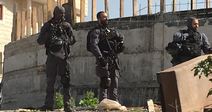
The Israeli Occupation Forces (IOF) on Tuesday evening levelled Palestinian lands in Ras al-Ahmar village, southeast of Tubas, for the construction of a new road to serve Israeli settlers.
Four Israeli bulldozers destroyed a water pipeline that was supplying the village with fresh water as they razed the land to open the road, according to the local activist Motaz Bisharat.
The IOF declared the area a closed military zone and prevented its Palestinian residents from leaving their tents during the operation.
Ras al-Ahmar is often subjected to numerous Israeli violations including demolition, razing of land and military training.
Israeli Forces Demolish Water Pipeline in Jordan Valley Village
Israeli bulldozers destroyed a water pipeline supplying the northern Jordan Valley village of Ras al-Ahmar with fresh drinking water, before dawn on Wednesday.
According to a local official, Mutaz Bisharat, four Israeli bulldozers raided the Ras al-Ahmar village, along with seven Israeli military jeeps, and began to destroy the pipeline.
Bisharat added, according to Ma’an, that Israeli bulldozers razed the land for five hours, in order to create a military road.
He pointed out that the destroyed pipeline was used by local Palestinian farmers, for drinking water and crop irrigation.
Israeli forces destroyed a water pipeline of 1,500 meters and 6 inches in length, and created a 2.5 kilometer-long road linking the main road of Ras al-Ahmar village to the Msheibek area, which Israel declared a closed military zone.
Locals reported that, while Israeli forces razed the land, Palestinian residents were prevented from entering or exiting the area.
Khirbet Ras al-Ahmar is one of approximately 180 Palestinian villages, in the occupied West Bank, located on lands designated as ‘Area C’ — the area of the West bank under full Israeli security and civilian control — according to Israeli human rights NGO B’Tselem.
The village is often raided by Israeli forces, who perform various military operations in the area, forcing residents of the village to leave their homes for several hours or even days.
Additionally, the village is a designated Israeli military “firing zone.”
Nearly 20 percent of the occupied West Bank has been declared “firing zones” since the 1970s, but, according to the UN, nearly 80 percent of these areas are not in fact used for military training.
Rights groups have accused Israel of declaring some parts of the West Bank as firing zones as an attempt to annex these areas.
Four Israeli bulldozers destroyed a water pipeline that was supplying the village with fresh water as they razed the land to open the road, according to the local activist Motaz Bisharat.
The IOF declared the area a closed military zone and prevented its Palestinian residents from leaving their tents during the operation.
Ras al-Ahmar is often subjected to numerous Israeli violations including demolition, razing of land and military training.
Israeli Forces Demolish Water Pipeline in Jordan Valley Village
Israeli bulldozers destroyed a water pipeline supplying the northern Jordan Valley village of Ras al-Ahmar with fresh drinking water, before dawn on Wednesday.
According to a local official, Mutaz Bisharat, four Israeli bulldozers raided the Ras al-Ahmar village, along with seven Israeli military jeeps, and began to destroy the pipeline.
Bisharat added, according to Ma’an, that Israeli bulldozers razed the land for five hours, in order to create a military road.
He pointed out that the destroyed pipeline was used by local Palestinian farmers, for drinking water and crop irrigation.
Israeli forces destroyed a water pipeline of 1,500 meters and 6 inches in length, and created a 2.5 kilometer-long road linking the main road of Ras al-Ahmar village to the Msheibek area, which Israel declared a closed military zone.
Locals reported that, while Israeli forces razed the land, Palestinian residents were prevented from entering or exiting the area.
Khirbet Ras al-Ahmar is one of approximately 180 Palestinian villages, in the occupied West Bank, located on lands designated as ‘Area C’ — the area of the West bank under full Israeli security and civilian control — according to Israeli human rights NGO B’Tselem.
The village is often raided by Israeli forces, who perform various military operations in the area, forcing residents of the village to leave their homes for several hours or even days.
Additionally, the village is a designated Israeli military “firing zone.”
Nearly 20 percent of the occupied West Bank has been declared “firing zones” since the 1970s, but, according to the UN, nearly 80 percent of these areas are not in fact used for military training.
Rights groups have accused Israel of declaring some parts of the West Bank as firing zones as an attempt to annex these areas.
24 july 2018
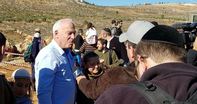
Dozens of Israeli settlers at dawn Tuesday stormed Al-Batan village, east of Nablus, under heavy military protection.
According to the Palestinian official in charge of the settlement file in the northern part of the West Bank, Ghassan Douglas, the settlers stormed early today the water park in the village escorted by Israeli army.
Douglas warned of the seriousness of such break-ins which aim at taking control over the Palestinian water resources.
According to the Palestinian official in charge of the settlement file in the northern part of the West Bank, Ghassan Douglas, the settlers stormed early today the water park in the village escorted by Israeli army.
Douglas warned of the seriousness of such break-ins which aim at taking control over the Palestinian water resources.
19 july 2018
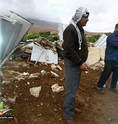
Israeli police demolished on Thursday morning two Palestinian-owned houses in Beit Hanina town, in occupied Jerusalem, under the pretext of being built without permit.
Police forces stormed the town early today accompanied with a number of bulldozers and started demolishing two houses belonging to Shawamra and Abu Armiya families.
Israel has escalated over the past few days its demolition policy where a Palestinian house was demolished in Shufat neighborhood on Tuesday, while a Jerusalemite man was forced to demolish his own house in Silwan town on Monday.
Meanwhile, Israeli forces destroyed water pipelines in Furush Beit Dajan village, east of Nablus.
Deputy Mayor of Furush Beit Dajan, Azzam al-Hajj Mohammad, said that Israeli forces escorted bulldozers as they destroyed pipelines supplying water for farmlands and residential homes under the pretext of being unauthorized.
Police forces stormed the town early today accompanied with a number of bulldozers and started demolishing two houses belonging to Shawamra and Abu Armiya families.
Israel has escalated over the past few days its demolition policy where a Palestinian house was demolished in Shufat neighborhood on Tuesday, while a Jerusalemite man was forced to demolish his own house in Silwan town on Monday.
Meanwhile, Israeli forces destroyed water pipelines in Furush Beit Dajan village, east of Nablus.
Deputy Mayor of Furush Beit Dajan, Azzam al-Hajj Mohammad, said that Israeli forces escorted bulldozers as they destroyed pipelines supplying water for farmlands and residential homes under the pretext of being unauthorized.
16 july 2018

The Awqaf (Endowment) and al-Aqsa affairs Department in Jerusalem exposed on Monday Israeli excavations being conducted under al-Aqsa mosque.
In a statement, the Department said that the excavations are carried out under the northern side of the Islamic museum in the western part of the holy site.
The statement also highlighted that Israeli police take photos of the area on a daily bases and affirmed the disappearance of water placed in different locations in the museum park.
Head of the Awqaf Department, Azzam al-Khatib, asked UNESCO to intervene for exploring the Israeli ongoing excavations under the holy shrine.
He also asked Israeli police to permit a committee to be appointed by the Jordanian government to access the excavations site and to assess the situation.
In a statement, the Department said that the excavations are carried out under the northern side of the Islamic museum in the western part of the holy site.
The statement also highlighted that Israeli police take photos of the area on a daily bases and affirmed the disappearance of water placed in different locations in the museum park.
Head of the Awqaf Department, Azzam al-Khatib, asked UNESCO to intervene for exploring the Israeli ongoing excavations under the holy shrine.
He also asked Israeli police to permit a committee to be appointed by the Jordanian government to access the excavations site and to assess the situation.
12 july 2018
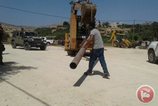
Israeli forces raided the Palestinian village of Bardala, in the northern area of the Jordan Valley, and destroyed 400 meters of water pipelines, which Israel claims are illegal, on Thursday.
According to Dirar Sawafta, a member of the Bardala village council, Israeli forces stormed the village, razed and dug several holes in one of the water lines in search of water holes.
Israeli forces destroyed more than 400 meters of water pipelines, which is an important life source to many Palestinians residents of the valley, who are mainly farmers or Bedouins, and mostly living in enclaves closed off by Israeli military zones, checkpoints, and more than 30 illegal Israeli settlements.
Sawafta added, according to Ma’an, that Israeli forces destroyed the water pipelines under the pretext that they are illegal.
Recently, Israeli bulldozers and forces have razed the area, in search of water holes, and destroyed several water sources in the village and several other areas in the Jordan Valley.
The Jordan Valley and Dead Sea area holds nearly one-third of the West Bank’s land and is home to roughly 60,000 Palestinians.
Under the 1993 Oslo Accords, which delegated various degrees of autonomy to the Palestinian Authority (PA) around built up and urban areas, Israel retained full civil and military control over 60% of the West Bank, which is now known as “Area C.”
“Area A” is under full PA control and “Area B” is under Israeli military control; in this area the PA is in charge of civilian affairs. This has effectively divided the West Bank into three main non-contiguous areas.
According to Dirar Sawafta, a member of the Bardala village council, Israeli forces stormed the village, razed and dug several holes in one of the water lines in search of water holes.
Israeli forces destroyed more than 400 meters of water pipelines, which is an important life source to many Palestinians residents of the valley, who are mainly farmers or Bedouins, and mostly living in enclaves closed off by Israeli military zones, checkpoints, and more than 30 illegal Israeli settlements.
Sawafta added, according to Ma’an, that Israeli forces destroyed the water pipelines under the pretext that they are illegal.
Recently, Israeli bulldozers and forces have razed the area, in search of water holes, and destroyed several water sources in the village and several other areas in the Jordan Valley.
The Jordan Valley and Dead Sea area holds nearly one-third of the West Bank’s land and is home to roughly 60,000 Palestinians.
Under the 1993 Oslo Accords, which delegated various degrees of autonomy to the Palestinian Authority (PA) around built up and urban areas, Israel retained full civil and military control over 60% of the West Bank, which is now known as “Area C.”
“Area A” is under full PA control and “Area B” is under Israeli military control; in this area the PA is in charge of civilian affairs. This has effectively divided the West Bank into three main non-contiguous areas.
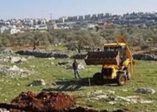
Israeli soldiers started, Thursday, bulldozing Palestinian agricultural lands in Bardala village, in the West Bank’s Northern Plains.
The Israeli army claimed the soldiers are searching for what it called “illegal irrigation systems.”
Dirar Sawafta, a member of Bardala Village Council, said many soldiers invaded the lands, and dug three holes around irrigation lands, trying to find what the army described as “illegal connections to the main water system.” video
He added that the soldiers frequently dug around the main line, under the same allegations.
Water shortages are one of the most issues the Palestinians face is the occupied West Bank, not only the Northern Plains of the West Bank, but in many parts of the territory, an issue which severely devastates agriculture, and the livelihoods on hundreds of families.
In Summer, the Palestinians go for several weeks at a time without running water, and in numerous cases, the army demolishes Palestinian water wells, while the illegal colonialist settlers suffer from water shortages, or interruptions, for their homes, colonies’ lands and swimming pools.
The Israeli army claimed the soldiers are searching for what it called “illegal irrigation systems.”
Dirar Sawafta, a member of Bardala Village Council, said many soldiers invaded the lands, and dug three holes around irrigation lands, trying to find what the army described as “illegal connections to the main water system.” video
He added that the soldiers frequently dug around the main line, under the same allegations.
Water shortages are one of the most issues the Palestinians face is the occupied West Bank, not only the Northern Plains of the West Bank, but in many parts of the territory, an issue which severely devastates agriculture, and the livelihoods on hundreds of families.
In Summer, the Palestinians go for several weeks at a time without running water, and in numerous cases, the army demolishes Palestinian water wells, while the illegal colonialist settlers suffer from water shortages, or interruptions, for their homes, colonies’ lands and swimming pools.
5 july 2018
|
|

Israeli forces demolish buildings in Abu Nuwar, July 4, 2018. Photo credit: WAFA.
POSTED BY: ALTERNATIVE INFORMATION CENTER JULY 5, 2018 At least 62 Palestinian Bedouins of the Abu Nuwar community in Jerusalem are now homeless. Israeli forces demolished nine homes and three agricultural buildings in the Palestinian Bedouin community of Abu Nuwar at 9:00AM on July 4, 2018. Abu Nuwar lies on the eastern outskirts of Jerusalem in the central West Bank. |
Ma’an News reported that Israeli forces raided the village, evicted locals from their homes, removed some of their belongings, and then demolished the structures. Israeli human rights group B’Tselem estimates that the demolitions left 62 people newly homeless.
According to the UN Office for the Coordination of Humanitarian Affairs (OCHA), at least 670 Palestinians live in Abu Nuwar, 88 percent of whom are refugees. Abu Nuwar is located in Area C of the West Bank on the outskirts of Jerusalem, meaning it is under full Israeli military and civil control.
Between 2010 and 2014, OCHA found that Israeli authorities approved just 1.5 percent of Palestinian building applications in Area C. Moreover, Abu Nuwar is one of the dozens of Palestinian Bedouin communities in the central West Bank at heightened risk of forcible transfer due to Israeli plans that aim to settle eastern Jerusalem (the E1 corridor) and thereby connect Ma’ale Adumim settlement to Jerusalem.
Israeli demolitions in Jerusalem appear to be on the rise since the month of Ramadan ended – a time when Israeli authorities will temporarily halt most demolitions. At the end of June, Israeli forces demolished nine Palestinian-owned buildings in Jerusalem just four days.
According to the UN Office for the Coordination of Humanitarian Affairs (OCHA), at least 670 Palestinians live in Abu Nuwar, 88 percent of whom are refugees. Abu Nuwar is located in Area C of the West Bank on the outskirts of Jerusalem, meaning it is under full Israeli military and civil control.
Between 2010 and 2014, OCHA found that Israeli authorities approved just 1.5 percent of Palestinian building applications in Area C. Moreover, Abu Nuwar is one of the dozens of Palestinian Bedouin communities in the central West Bank at heightened risk of forcible transfer due to Israeli plans that aim to settle eastern Jerusalem (the E1 corridor) and thereby connect Ma’ale Adumim settlement to Jerusalem.
Israeli demolitions in Jerusalem appear to be on the rise since the month of Ramadan ended – a time when Israeli authorities will temporarily halt most demolitions. At the end of June, Israeli forces demolished nine Palestinian-owned buildings in Jerusalem just four days.
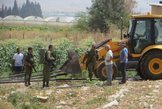
Israeli soldiers dismantled and seized, on Thursday, 200 meters of water pipes from residents of the village of Bardalla, in the northern Jordan Valley, who built them in order to provide their village with fresh water, according to Aref Daraghmeh, a local human rights activist.
He said the pipes were not yet ready for use.
Soldiers also demolished, on Wednesday, a pool used to collect rain water in the village of al-Farisiyeh, in the northern Jordan Valley.
Israel, which controls Area C of the occupied West Bank where the two villages are located, does not allow any Palestinian construction, even in infrastructure, as it attempts to keep Palestinian presence in Area C to a minimum in order to later annex the entire, scarcely populated area that makes around 60 percent of the area of the occupied West Bank.
He said the pipes were not yet ready for use.
Soldiers also demolished, on Wednesday, a pool used to collect rain water in the village of al-Farisiyeh, in the northern Jordan Valley.
Israel, which controls Area C of the occupied West Bank where the two villages are located, does not allow any Palestinian construction, even in infrastructure, as it attempts to keep Palestinian presence in Area C to a minimum in order to later annex the entire, scarcely populated area that makes around 60 percent of the area of the occupied West Bank.
20 june 2018
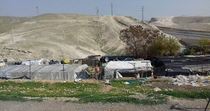
Israeli soldiers delivered, Wednesday, demolition orders targeting seven wells and a shed, in Teqoua’ town, south of Bethlehem in the occupied West Bank.
The soldiers handed seven orders for the demolition of water wells built on private Palestinian lands.
The wells are owned by Ahmad Khalaf Jibreel, Ibrahim Mohammad Jibreel, and Salem Za’al Jibreel, Atiya Mousa Jibreel, Salam Abu Mfarreh, Ali Mahmoud Khatib and Ali Yousef Nuwwara.
Furthermore, the soldiers handed another demolition order targeting a shed, owned by Monir Mahmoud Suleiman.
The soldiers handed seven orders for the demolition of water wells built on private Palestinian lands.
The wells are owned by Ahmad Khalaf Jibreel, Ibrahim Mohammad Jibreel, and Salem Za’al Jibreel, Atiya Mousa Jibreel, Salam Abu Mfarreh, Ali Mahmoud Khatib and Ali Yousef Nuwwara.
Furthermore, the soldiers handed another demolition order targeting a shed, owned by Monir Mahmoud Suleiman.
11 june 2018
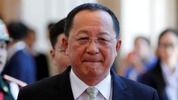
The North Korean account, whose authenticity Haaretz could not confirm, responded to a video published by the Israeli premier on Twitter offering Iran water tech.
Israel's Foreign Ministry spokesman responded on Monday to an insult tweeted by an account claiming to belong to the North Korean foreign minister.
In a tweet, Ri Yong-Ho called Prime Minister Benjamin Netanyahu a "Stinking Zionist," blasting the premier for killing the people of Gaza. The tweets by the minister were made from an unverified account, and Haaretz could not independently confirm its authenticity.
The statement was made in response to a video published on Netanyahu's account on Sunday.
Ministry spokesman Emmanuel Nahshon responded to the North Korean tweet: "On the bright side- you follow us on Twitter and react. On the negative side- you insult us with no reason."
Nahshon insisted Israel is a peace seeking nation, "defending itself against a brutal and hate filled Iranian regime seeking our destruction."
The Twitter account does not have a verified icon, and has only 2,000 followers. A senior expert on North Korea told Haaretz he is not familiar with the account. Furthermore, renowned research organizations specializing in North Korea are not among the followers.
In the video, Netanyahu takes a sip from a glass of water before alerting that Iran is facing a drought. He then accuses the regime led by Supreme Leader Ali Khamenei of using the country's resources for malign purposes and of neglecting its people.
In the response, a tweet in the account claiming to belong to Yong-Ho dismissed Netanyahu as a "criminal/liar" who wouldn't deliver on his promise. "Meanwhile he can't be bothered giving water to Gaza; he kills them instead."
The Twitter exchange was made as U.S. President Donald Trump and North Korea were preparing for a summit Tuesday in Singapore aimed at getting Kim to give up his nuclear weapons.
This is not the first time Israel and North Korea have traded rhetorical barbs. In 2017, Defense Minister Avigdor Lieberman said in an interview to the Walla! news site that the country's sole goal was "undermining global stability," and called its leadership "a crazy and radical group."
In response, a statement released by the North Korean Foreign Ministry called Avigdor Lieberman's statement "reckless" and a form of "sordid and wicked behavior" that posed a "grave challenge to the Democratic People's Republic of Korea."
In January 2015, North Korea fumed at Israel after Prime Minister Benjamin Netanyahu accused the so-called DPRK of "enforcing merciless and radical dictatorship," while on a visit to Japan. Calling Netanyahu's remarks "an unpardonable insult," North Korea charged at the Israeli occupation of the Palestinian territories.
North Korea has also criticized Israel on other occasions, charging at its settlements in the West Bank, its conduct during the 2014 war in Gaza and at alleged Israeli airstrikes in Syria.
North Korea is considered one of the world's most hostile nations toward Israel. In the last decades, it has provided training, arms and various technologies to entities considered enemies of the Jewish state, including Iran, whose missile program benefitted greatly from North Korean assistance.
Israel's Foreign Ministry spokesman responded on Monday to an insult tweeted by an account claiming to belong to the North Korean foreign minister.
In a tweet, Ri Yong-Ho called Prime Minister Benjamin Netanyahu a "Stinking Zionist," blasting the premier for killing the people of Gaza. The tweets by the minister were made from an unverified account, and Haaretz could not independently confirm its authenticity.
The statement was made in response to a video published on Netanyahu's account on Sunday.
Ministry spokesman Emmanuel Nahshon responded to the North Korean tweet: "On the bright side- you follow us on Twitter and react. On the negative side- you insult us with no reason."
Nahshon insisted Israel is a peace seeking nation, "defending itself against a brutal and hate filled Iranian regime seeking our destruction."
The Twitter account does not have a verified icon, and has only 2,000 followers. A senior expert on North Korea told Haaretz he is not familiar with the account. Furthermore, renowned research organizations specializing in North Korea are not among the followers.
In the video, Netanyahu takes a sip from a glass of water before alerting that Iran is facing a drought. He then accuses the regime led by Supreme Leader Ali Khamenei of using the country's resources for malign purposes and of neglecting its people.
In the response, a tweet in the account claiming to belong to Yong-Ho dismissed Netanyahu as a "criminal/liar" who wouldn't deliver on his promise. "Meanwhile he can't be bothered giving water to Gaza; he kills them instead."
The Twitter exchange was made as U.S. President Donald Trump and North Korea were preparing for a summit Tuesday in Singapore aimed at getting Kim to give up his nuclear weapons.
This is not the first time Israel and North Korea have traded rhetorical barbs. In 2017, Defense Minister Avigdor Lieberman said in an interview to the Walla! news site that the country's sole goal was "undermining global stability," and called its leadership "a crazy and radical group."
In response, a statement released by the North Korean Foreign Ministry called Avigdor Lieberman's statement "reckless" and a form of "sordid and wicked behavior" that posed a "grave challenge to the Democratic People's Republic of Korea."
In January 2015, North Korea fumed at Israel after Prime Minister Benjamin Netanyahu accused the so-called DPRK of "enforcing merciless and radical dictatorship," while on a visit to Japan. Calling Netanyahu's remarks "an unpardonable insult," North Korea charged at the Israeli occupation of the Palestinian territories.
North Korea has also criticized Israel on other occasions, charging at its settlements in the West Bank, its conduct during the 2014 war in Gaza and at alleged Israeli airstrikes in Syria.
North Korea is considered one of the world's most hostile nations toward Israel. In the last decades, it has provided training, arms and various technologies to entities considered enemies of the Jewish state, including Iran, whose missile program benefitted greatly from North Korean assistance.
